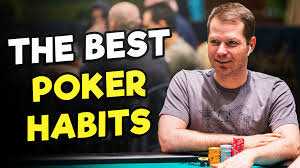Additionally, acknowledging that walking away can be a sign of strength rather than weakness is essential. While it might feel counterintuitive, leaving the table during unfavorable conditions allows you to return rejuvenated and ready to tackle new challenges 58winvina.com.
Developing a Poker Habits Mindset for Long-Term Success
A strong poker mindset is an essential component of sustaining your poker habits over time. Cultivating discipline, focus, and a positive attitude can help you navigate ups and downs while remaining committed to your development as a player.
The role of discipline and focus
Discipline plays a pivotal role in your long-term success at the poker table. Adhering to a well-defined strategy and resisting temptations to deviate from it is crucial for maintaining consistency. Establish simple rules for yourself, such as maintaining a specific bankroll management plan or limiting the number of tables you play at once.
Focus is equally important. With distractions lurking both online and offline, sharpening your concentration during sessions can lead to better decision-making. Developing techniques for minimizing distractions—like choosing a quiet environment or utilizing noise-canceling headphones—can help maintain your focus.
Ultimately, combining discipline with focus creates a powerful synergy that enables you to thrive in challenging situations. Your ability to stay committed to your plan increases the likelihood of achieving favorable outcomes.
Cultivating a positive mental attitude
Cultivating a positive mental attitude is a vital part of developing strong poker habits. The emotional landscape of poker can swing dramatically with each hand, making it easy to succumb to negativity. Focus on reframing challenges as opportunities for growth.
Practice gratitude by acknowledging small victories, whether it’s a well-played hand or a successful bluff. This mindset shift fosters resilience and encourages constructive reflection instead of dwelling on losses.
Additionally, surrounding yourself with supportive individuals who share your passion for poker can reinforce positivity. Engaging in discussions about strategy, celebrating achievements, and sharing experiences cultivates a community-driven environment that enhances your mental outlook.
Staying motivated through setbacks and losses
Setbacks in poker are inevitable, but how you respond defines your trajectory. Maintaining motivation during periods of loss requires a flexible mindset and an unwavering commitment to your goals. Embrace the challenge as part of your learning process rather than viewing it as a personal failure.
Establish short-term and long-term objectives to keep your drive alive. While focusing on individual hands or sessions can provide immediate satisfaction, having overarching goals offers perspective during challenging times. Evaluate your progress regularly and adjust your strategy accordingly.
Engaging in poker communities, participating in workshops, or following insightful content can also reignite your passion. Continual learning fuels excitement and reinvigorates your dedication to improvement.
Conclusion
Mastering Poker Habits is a journey that requires dedication, self-awareness, and continuous improvement. By cultivating core habits such as patience, emotional control, and self-analysis, along with establishing strong routines, embarking on this path can lead to sustained success.
Overcoming common mistakes, developing a resilient mindset, and staying motivated through challenges will solidify your foundation as a poker player. The road to mastery is gradual, but with focus and commitment, you can unlock your true potential at the poker table.
Ultimately, remember that poker is not just a game of cards—it’s a game of people and psychology. Investing in your poker habits can empower you to navigate this intricate landscape and achieve consistent winnings. Happy playing!






